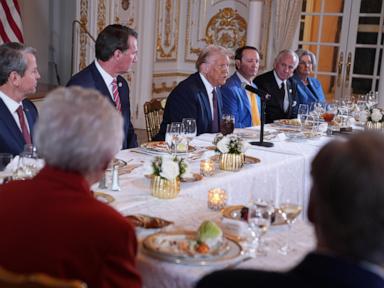How we talk about Greenland matters to our alliances around the world

President Trump deserves credit for understanding that in our age of satellites and cyberspace, physically controlling strategic places still matters.
Greenland is important because of its untapped natural resources, and because its location commands the Arctic. As the ice melts, North America is gaining a new frontier with Russia, prompting a necessary review of U.S. security in a contested region.
Greenland matters, but how the U.S. talks about Greenland matters more for U.S. interests around the world.
It's important to remember that Greenland is already fundamentally secure. Denmark, which controls defense policy for the autonomous island, is a NATO ally and longstanding friend of the U.S. The American military already maintains a presence on the island and the Danes are inclined to support expanding its role. Greenland’s local parliament is equally amenable to economic and military cooperation with Washington.
Greenland has no interest in becoming an Arctic outpost for the Russian military. There’s also no reason to believe it favors Chinese companies over American ones as it seeks to develop its mineral reserves.
Greenland’s aversion to Russia and skepticism of China is not an accident of history. Its feelings are rooted in the Western values that influence its geopolitical outlook. Greenland’s goodwill toward the U.S. is based on the shared nature of these values, and on its trust in the restrained exercise of American power.
Any willingness by the U.S. to use coercive power undermines that trust and the trust that underpins the most powerful network of alliances in history.
America’s alliances are possible because the country is the first great power in history without territorial ambitions. Historic powers, from Rome to the Ottomans to the British, habitually sought control over the territory of others.
American history isn’t free of these pursuits, but for almost 80 years our country has existed at the height of its power without seeking new territory. Any suggestion that the U.S. had abandoned its restrained view on the exercise of power would make foreign countries leery of our influence and destabilize our alliances.
American interests in Greenland illustrate how much those alliances matter. Through NATO, the U.S. can deter Russia in Greenland with a limited military force on the island. So long as Russia believes the U.S. and Europe will fight to defend NATO territory, Russian action to seize Greenland is unthinkable.
Economically, the exploitation of Greenland’s resources is only possible because of the peaceful conditions encouraged by America’s alliances. These alliances have discouraged armed conflict between major states for 80 years. They have benefited the American people by sparing them the horrors of major conflict, and by creating a world where commerce can grow.
The existence of our alliances, so critical to the world we know, depends on the belief by other nations that our country can be trusted with power.
Rather than appeal to Denmark’s goodwill, President Trump’s rhetoric risks trapping the U.S. in a cycle of increasing coercion. As countries come to distrust American power, each will be less inclined to acquiesce to our interests voluntarily. If those interests are important enough, the U.S. will have no choice but to overcome their reticence by threatening consequences to achieve our aims.
Coercion would replace the existing system based on trust and goodwill, and countries would inevitably seek new international arrangements to balance America’s coercive power. This would weaken the U.S. just as we enter a critical phase in our competition with Russia and China.
How the U.S. talks about Greenland, and how we talk about other strategic places like the Panama Canal, will either strengthen or undermine our network of international alliances.
Greenland is important to U.S. security but it’s only one of many concerns in a complex world. Trying to change the status quo in Greenland, while undermining the trust that makes the system of alliances possible, is counterproductive in the extreme. It’s also unnecessary since Denmark is ready to accommodate America’s strategic needs.
President Trump’s suggestion that the U.S. might use coercive means to alter conditions in Greenland gets the U.S. nothing it doesn’t already have. At the same time, it puts in jeopardy the hard-earned image of America as a benevolent power and weakens the trust that underpins our alliances.
Lacking trust and operating with weakened alliances, to achieve its ends the U.S. would need to become something it’s never been: A bully on the world stage. This not only sacrifices the moral high ground, but it also leaves America less safe than it’s been for 80 years.
Colin Pascal is a retired Army lieutenant colonel and Military Intelligence officer. He spent most of his 20-year military career filling strategic intelligence assignments, including in support of NATO and international military coalitions in the Middle East. He is a graduate student in the School of Public Affairs at American University in Washington, D.C.
-

'Forget Misfits - we should be talking about superstar Scotney'
BBC Sport columnist Hannah Rankin says British world champion Ellie Scotney deserves more attention - and backs her to beat Mea Mottu on Saturday.BBC News - 18h -

Han Kang Talks About Her Jeju Book, ‘We Do Not Part”
Han Kang’s latest novel, about a South Korean massacre, delves into why atrocities must be remembered. “It’s pain and it is blood, but it’s the current of life,” she said.The New York Times - 3d -

TikTok Changed How We Talk About Health
It has turned doctors into stars, put taboo subjects on main and given all of us a place to explore our well-being.The New York Times - Jan. 17 -

Snyder's Soapbox: Are we a 'we?' On how fans talk about their favorite sports team
You may not take the field, but does that mean you aren't a part of the team?CBS Sports - Jan. 14 -

We built our world with fire. Now heat is destroying our lives | John Vaillant
We fell in love with the power and speed that fossil fuels brought us. But the price being paid in California, and around the world, has become too high. Zero per cent contained. In layperson’s ...The Guardian - Jan. 11 -

Trump hosts Republican governors in Florida and talks anew about Greenland and drones
President-elect Donald Trump hosted 22 of the nation’s 27 Republican governors for dinner at his Florida club, looking to help drive the agenda in conservative-run states after he takes office in ...ABC News - Jan. 10 -

How to talk to kids about natural disasters
Here are some practical, research-backed ways to talk to children about natural disasters while keeping their emotional well-being—and your own—in mind.ABC News - Jan. 9 -

Ros Atkins: Why is Trump talking about annexing Greenland?
The BBC's analysis editor Ros Atkins takes a look at why President-elect Donald Trump is talking about annexing Greenland.BBC News - Jan. 8 -

Why is Donald Trump talking about annexing Greenland?
The US president-elect has refused to rule out military force to take control. This is why it is important – and what Greenlanders think. Hours after his son Donald Trump Jr touched down in the ...The Guardian - Jan. 8
More from The Hill
-

OPM orders termination of DEI offices within 60 days
President Trump’s Office of Personnel Management (OPM) is ordering every head of departments and agencies to terminate all diversity, equity and inclusion (DEI) offices and workers within 60 days. ...The Hill - 41m -

Senate puts Noem on doorstep of DHS confirmation
South Dakota Gov. Kristi Noem (R) moved a step closer to leading the Department of Homeland Security as the Senate voted on Friday to advance her to a final confirmation vote. Senators voted 61-39 ...The Hill - 44m -

Vance breaks tie to confirm Pete Hegseth as Defense secretary
Vice President Vance on Friday broke a Senate tie to confirm Pete Hegseth as President Trump's secretary of Defense, capping a bruising two-month fight over the nominee, who faced a litany of ...The Hill - 1h -

McConnell opposes Hegseth on final confirmation vote
Former Senate Republican Leader Mitch McConnell (Ky.), who stepped down from the leadership at the end of last year, cast a surprise vote Friday night against Pete Hegseth, President Trump’s ...The Hill - 1h -

Live updates: Vance breaks tie to confirm Hegseth as Trump's Defense secretary
Vice President Vance on Friday broke a Senate tie to confirm Pete Hegseth as President Trump's secretary of Defense. Republican Sens. Mitch McConnell (Ky.), Lisa Murkowski (Alaska) and Susan ...The Hill - 2h
More in Politics
-

OPM orders termination of DEI offices within 60 days
President Trump’s Office of Personnel Management (OPM) is ordering every head of departments and agencies to terminate all diversity, equity and inclusion (DEI) offices and workers within 60 days. ...The Hill - 41m -

Senate puts Noem on doorstep of DHS confirmation
South Dakota Gov. Kristi Noem (R) moved a step closer to leading the Department of Homeland Security as the Senate voted on Friday to advance her to a final confirmation vote. Senators voted 61-39 ...The Hill - 44m -

Vance breaks tie to confirm Pete Hegseth as Defense secretary
Vice President Vance on Friday broke a Senate tie to confirm Pete Hegseth as President Trump's secretary of Defense, capping a bruising two-month fight over the nominee, who faced a litany of ...The Hill - 1h -

McConnell opposes Hegseth on final confirmation vote
Former Senate Republican Leader Mitch McConnell (Ky.), who stepped down from the leadership at the end of last year, cast a surprise vote Friday night against Pete Hegseth, President Trump’s ...The Hill - 1h -

Live updates: Vance breaks tie to confirm Hegseth as Trump's Defense secretary
Vice President Vance on Friday broke a Senate tie to confirm Pete Hegseth as President Trump's secretary of Defense. Republican Sens. Mitch McConnell (Ky.), Lisa Murkowski (Alaska) and Susan ...The Hill - 2h